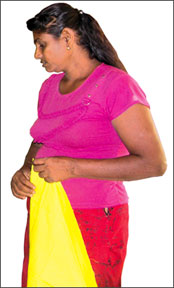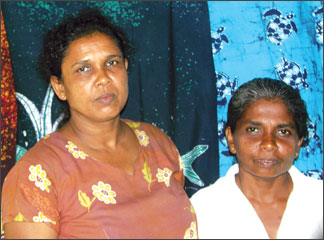‘Mermaids’ of Rekawa turn to Batik art
by Nilma Dole
[email protected]
|

Kusuma - decided to take up Batik
|
“I remember how I used to swim 50 to 100 metres from the shore and
then, dive 10 to 15 metres underwater to search for corals” reminces
Piyaseeli Suwandakandewa. Those days, the whole community of Rekawa were
involved in this profession.
Piyaseeli says “I grew up watching my mother literally ‘diving’ into
this profession because my grandmother did it too. She taught me the
tricks of the trade so I eventually took it up”.
The coral mining contraption they use is planks of wood (three or
four) joined together on to a used vehicle tyre. A fishing line from a
fishing rod is used along with a large stone used to anchor the tyre. A
metal rod (‘alawanguwa’) is used to chip away at the corals to dig and
collect them.
In this way, the Rekawa women divers used to make a hard-earned
living not knowing the severe impact this has on nature. The ecosystem
and food chain have been greatly affected threatening the endangered
turtles who make the Rekawa beach their home.
Talking about how they used to balance their career and home lives
Malani says “We got up early in the morning to cook for our families and
went out to work as early as possible before the sun rises”.
She says that as long as they worked to achieve the required target,
there was no problem. However, certain environment factors might make
them return another day to achieve their targets.
The women divers usually live with other family members who also help
out in the house and one diver Karuna mentioned that even her husband
helps around the house and supports the children.
During pregnancy, the women divers do not work and during this time
other members in the community help them out. Since the whole community
is involved in this trade, there is a fair degree of safety for the
women.
|

M.M Malani and Piyaseeli Suwandakande are now happy creating
works of art in Batik |
“We usually go in a group, a maximum of four women”, says Piyaseeli.
They have never had any bad experiences in the sea where men have
harassed them. Their swimming kits are thin cloth wrapped around their
bodies which are tied at the ends of their legs, hips and arms.
They use only snorkels but have no oxygen tanks on their backs.
Expert woman diver, M. M. Malani says that she did this job because her
husband was also engaged in it. It was a career that was commonplace
within the community and wasn’t thought of as dangerous for women.
She says “We get a good income from it even though later, it became
illegal but at that time we didn’t have any other career”.
Surprisingly enough, there were no complications for these women
divers with sheer guts and determination. They have not had massive
obstacles that have affected their lives. For some others, the women
were the breadwinners because they were single mothers or widows.
Says Piyaseeli “Swimming and diving came naturally to us because we
lived all of our lives on the coast”.
The women divers had an inborn talent within them and were like the
mermaids of the Rekawa beach. They attended the Rekawa Kanista Vidyalaya
and studied till about Grade 10.
However, once they finished school, going into coral mining was the
norm and training was given to them by their family and community
members. Not one of them have ever drowned or suffered, diving many feet
even with their delicate feminine frames.
However, one expert diver Karuna suffered a mishap and related her
story “When a massive wave engulfed me while I was diving, my finger got
caught to the sharp fishing line attached to the tyre and was painfully
cut off”. But she hasn’t given up hope as yet.
“Mining corals is illegal and even though years before we got a good
income, we now realise how unethical it is to go back to it because
there is no market for it now”, points out Malani.
That is why the courageous women divers of Rekawa have come together
to bring a new meaning to their village by supporting and spreading the
love of the turtle through batik art. The Turtle Conservation Project
have reformed them into the Community Batik Group and their creative
talent and artistic skills have now been put into good use. |
